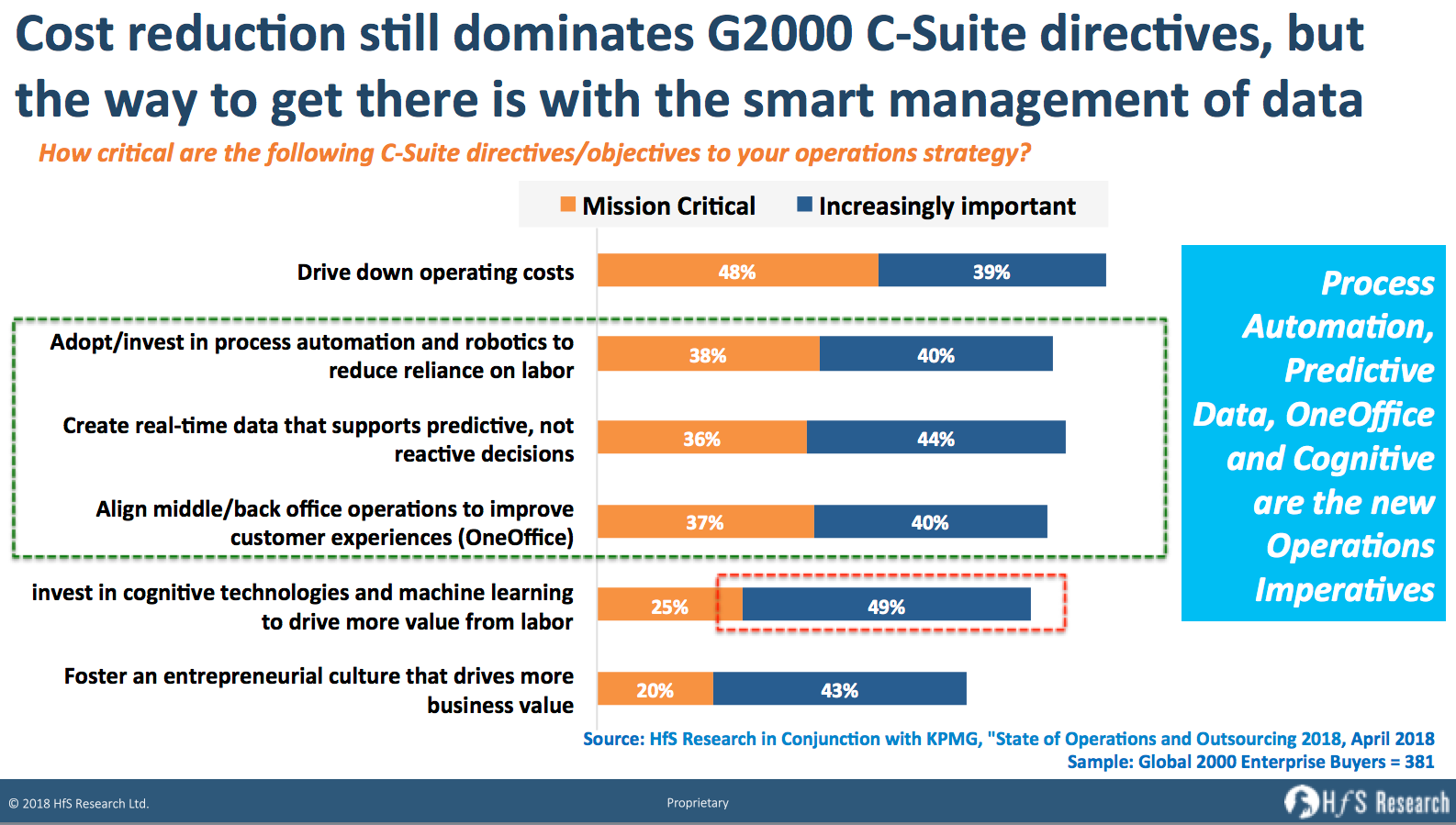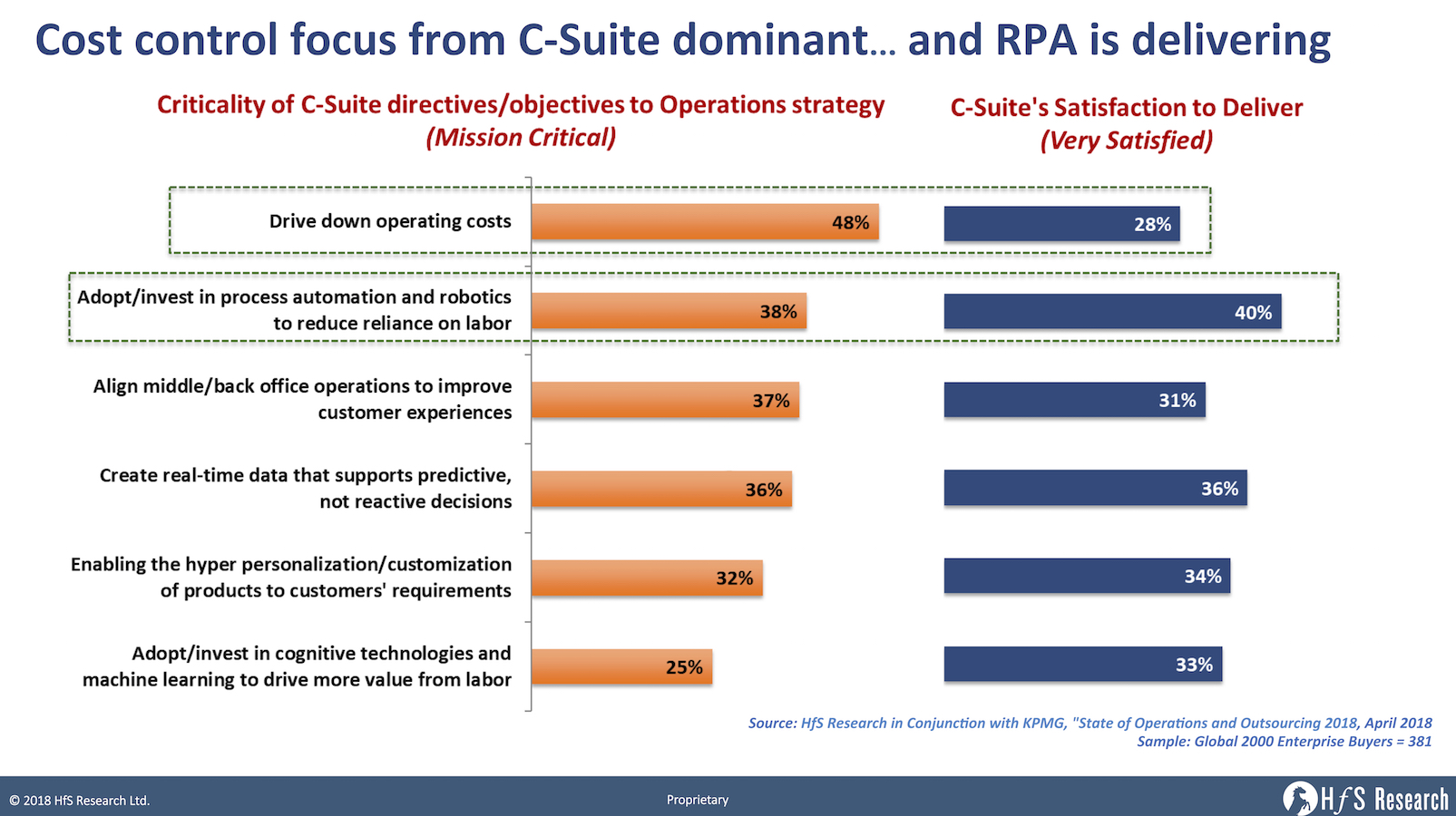
However which way we look at it, driving out costs from business operations still dominates the directives of C-Suites across the Global 2000 – just revisit our 2014 study to see how little has changed. Fast forward to today, and the only real differences, since then, are the methods to slake this thirst for cost elimination, as traditional operating models are no longer delivering much more than incremental value.
Our new State of Operations and Outsourcing Study, conducted with KPMG, covers the dynamics of 381 operations leaders from the Global 2000 and reveals these rapidly changing C-Suite directives to drive out their number one nemesis: cost.
Traditional cost savings models are running out of steam, as robotics, predictive analytics, OneOffice and cognitive become the new operating value levers
Little tweaks here and there to delivery locations and headcount allocations are becoming less and less effective, as it becomes clear only the fundamental rewiring of underpinning data repositories – and the digitization of manual processes – are going to progress operations to a place where real efficiencies can be enjoyed. In addition to fixing data and manual processes that clearly hit that old cost button, C-Suites are also recognizing the dire need have their customer needs being addressed by their employees as and when they occur (OneOffice), and also to invest more in cognitive tech and machine learning to drive more value from their current pool of talent:
Cost reduction mandates still fall well short, but expect to see them improve as data-driven initiatives bear fruit
The perennial issue here is clearly one where C-Suites rarely feel exhilarated by the cost reduction impact of their operations leaders. Of all their mission-critical directives this year (see above), none disappoints them as much as their ability to impact cost reduction (only 28% are very satisfied), while there are much larger numbers of C-Suite leaders already a lot happier with their robotic process investments (40% ‘very satisfied’ and a further 30% ‘satisfied’). However, as we continue to see this strong impact in these areas aligned to robotics, OneOffice, and predictive analytics, surely it’s merely a test of time until we see these initiatives having greater visibility, in terms of ironing out unnecessary costs and inefficiencies in the system.
The Bottom-line: It’s taken several decades, but our enterprises finally have no choice but to make fundamental changes to the very make up of their processes, data, and people if they are going to survive
Ever since my first blog 11 years ago (right here), we’ve pretty much repeated the same conversation that’s been continually refined over the years. The only game changers have been the gradual need for less people to run operations as cloud-based software platforms take-hold, offshore talent is optimized, and the more recent introduction of robotic process automation solutions to remove manual workarounds and create broader digital processes, that can be aligned with common business outcomes and metrics.
However, these changes are more fundamental than merely slimming down the number of cooks in the kitchen and making the food taste better: it’s forcing a complete rethink from ambitious firms to redesign operating frameworks where revamped business processes are enabling true digital business models, where emerging AI capabilities can be weaved in… where innovation is native to the culture of the firm and its people. Yes, it’s redesigning the entire kitchen, not merely hiring some better chefs with better recipes.
The toughest challenge is fixing many years of poorly-constructed data repositories, where the corporate IT ancestors that built them have likely long-since departed, and other IT stormtroopers from the midst of time have plastered on countless workarounds and spaghetti coding to keep the back end (somehow) functioning. These are the deep, murky areas where it’s frighteningly difficult for many firms to take the risk of investment and change to find their way out of the dark data ages. Somehow ripping out the very fabric of what got you here is what you may have to do to survive in the future… and that can be one very painful, risky and costly experience. Sure, you can keep papering over those yawning cracks, but the wallpaper just isn’t working like it used to…
Posted in : OneOffice, Robotic Process Automation, smac-and-big-data








The latest example of a traditional cost savings model running out of steam:
“The problem with WH Smith is that in order to flourish financially, it has entered a downward spiral of cutting costs on the high street to counteract falling sales, which becomes a vicious circle. It has slashed staff numbers, which leads to poor standards and service”
https://www.theguardian.com/business/2018/may/28/wh-smith-rated-uk-worst-high-street-shop-by-which-readers
The latest example of a traditional cost savings model running out of steam:
“The problem with WH Smith is that in order to flourish financially, it has entered a downward spiral of cutting costs on the high street to counteract falling sales, which becomes a vicious circle. It has slashed staff numbers, which leads to poor standards and service”
https://www.theguardian.com/business/2018/may/28/wh-smith-rated-uk-worst-high-street-shop-by-which-readers